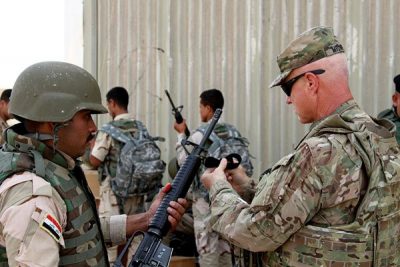Biden Isn’t Withdrawing Troops from Iraq, He’s Relabeling Their Mission
The move only serves to reinforce America’s forever wars.

All Global Research articles can be read in 51 languages by activating the “Translate Website” drop down menu on the top banner of our home page (Desktop version).
Visit and follow us on Instagram at @crg_globalresearch.
***
Iraqi Prime Minister Mustafa al-Kadhimi and President Biden announced this week that Washington will end its combat mission in Iraq by the end of the year. However, these long-serving U.S. soldiers are not coming home: many of the 2,500 American service members are expected to remain in the country for “training and advisory” purposes.
The United States and Iraq had issued a joint statement in April that the U.S. combat mission would be ending, but the timeline remained unclear. The timing of the recent announcement appears intended to boost Kadhimi’s prospects in October’s parliamentary elections — he faces domestic demands to oust U.S. forces, yet remains dependent on American support to maintain some semblance of control.
Many of the militia groups he now struggles to control initially assembled to fight the so-called Islamic State, or Daesh, starting in 2014. The Popular Mobilization Forces, or al-Ḥashd ash-Shaʿbī, many of whose fighters are Iraqi Shi’a, were supported by both the U.S. and Iran to defeat the Islamic State. The mobilization of these militias would not have been necessary if Paul Bremer and the Pentagon had not made the foolish decision to disband Iraq’s military following the U.S. invasion in 2003, as Iraq would still have possessed a functional army.
Washington clearly bears significant responsibility for the ongoing instability and dysfunction in Iraq, a fact that the announcement of $155 million in additional humanitarian aid for Iraq seems implicitly to acknowledge. Yet the U.S. military has consistently botched its missions in Iraq — keeping them in the country is in the interests of neither Americans nor Iraqis.
Renaming the stated goal of U.S. troops in Iraq will have little effect on their vulnerability to attack. Iraqi militia groups determined to evict U.S. troops from their country are increasingly acting without or against orders from Tehran. Ironically, Iran’s control of Iraqi militia groups unraveled following the assassination of Quds Force Commander Gen. Qassem Soleimani. Attacks on American forces have increased at a time when Tehran and Washington are attempting to negotiate a mutual return to the 2015 nuclear deal.
Announcing a troop withdrawal when no troops are in fact to be withdrawn reinforces a broader alarming trend in the forever wars — finding ways to keep American soldiers perpetually deployed, despite the public’s desire for the United States to prioritize investment at home over violence abroad.
Even more concerning are the expanding budget and scope of Pentagon’s “127e” programs, created after 9/11 to provide “support to foreign forces, irregular forces, groups, or individuals engaged in supporting or facilitating authorized ongoing military operations by United States special operations forces to combat terrorism.”
These “exceptional” and highly secretive counterterror deployments operate with very little public, congressional or DOD oversight.
The budget of 127e programs has quadrupled since 2005, from $25 million to $100 million annually. These funds are exempt from U.S. human rights conditions, like the “Leahy laws,” which bar the United States from backing foreign units credibly accused of gross abuses.
As became evident with the death of four U.S. soldiers in Niger in October 2017, these unauthorized 127e advisory operations pose a serious risk that combat-equipped U.S. forces will become involved in firefights.
The takeaway should be that, although a U.S. “advisory” mission in Iraq may sound harmless, it maintains the strong likelihood that U.S. forces will be shot at and will shoot back.
When Prime Minister al-Kadhimi came to power in May, he was seen as representing the rejection of overt Iranian influence over Iraq, a sentiment also expressed in widespread protests throughout Iraq starting in October 2019 that demanded an end to both Iranian and American intervention, as well as rampant government corruption. He faces a nearly impossible task, which is made more difficult by the ongoing attacks that are likely to continue as long as U.S. forces remain in his country’s territory — relabeled, or not.
*
Note to readers: Please click the share buttons above or below. Follow us on Instagram, @crg_globalresearch. Forward this article to your email lists. Crosspost on your blog site, internet forums. etc.

